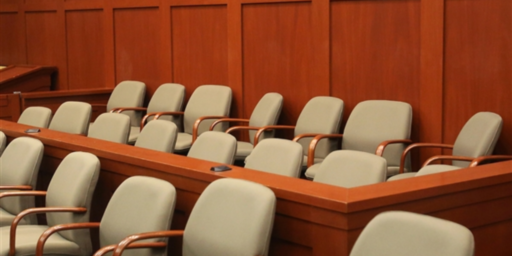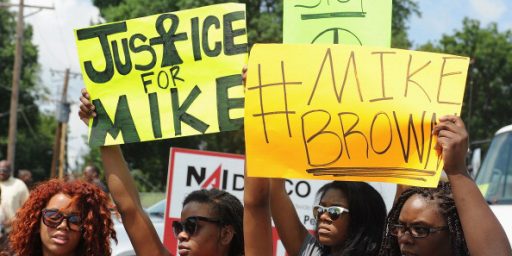Libby Juror: Scooter Guilty but the Fall Guy
Scooter Libby juror Denis Collins explains the thought process of the jury. It confirms and expands on some quotes highlighted yesterday at the Drudge Report.
Jurors in I. Lewis “Scooter” Libby’s perjury trial were certain of the former vice presidential aide’s guilt, but they also harbored sympathy for him as a “fall guy,” one of them said Tuesday after the verdict. Denis Collins, a Washington resident and self-described registered Democrat, said he and fellow jurors found that passing judgment on Libby was “unpleasant.” But in the final analysis, he said jurors found Libby’s story just too hard to believe.
“It was just very hard to believe how he could remember it on a Tuesday and forget it on a Thursday and then remember it two days later,” Collins told reporters outside U.S. District Court. “Having said that, I will say that there was a tremendous amount of sympathy for Mr. Libby on the jury.”
“It was said a number of times, ‘What are we doing with this guy here? Where’s [Karl] Rove … where are these other guys?’ “We’re not saying we didn’t think Mr. Libby was guilty of the things we found him guilty of, but it seemed like … he was the fall guy.”
Collins said the jury believed Libby was “tasked by the vice president to go and talk to reporters.” “We never even discussed whether Cheney would have told him what exactly to say,” Collins said.
That Libby was “tasked by the vice president to go and talk to reporters” was not in dispute. Still, the fact that the jurors apparently wanted the scalps of Rove and “these other guys” is rather revealing, since the only crime being alleged was lying to the FBI and the grand jury about where Libby learned about Valerie Wilson’s role in sending Joe Wilson to Niger.
Collins said none of the jurors appeared to hold any animosity toward Libby, and some expressed a distaste for passing judgment on him at all. “I had conversations with a couple of jurors who said, ‘Wow this part is not fun,’ ” said Collins. “It’s just a question of not wanting to pass judgment on anyone. And I felt the same way.” But he said the jury’s sympathy didn’t interfere with the verdict, “it was just the unpleasantness of doing it.”
Libby was a rather sympathetic figure in the case, I think, because it was clear that he was usually a policy wonk who was tasked with damage control on the Wilson matter. Ironically, the charge he was defending his boss from was almost certainly untrue. By all indications, the Office of the Vice President did not in fact send Joe Wilson to Niger and had never seen his report until the Nick Kristoff column in the NYT.
Collins also opened up about the nuts and bolts of the decision-making process. He said at one point jurors were using 35 Post-It pages that measured 2½ feet by 2 feet to help them break down the testimony. “We took about a week just to get all the building blocks there,” Collins said. “There were some incredibly good managerial-type people who just took everything apart in to the smallest piece, put it in the right places, and it got to the point where opinion had very little to do with it,” said Collins. “You just came to this conclusion that, ‘wow here it is, right before us.'”
That’s a DC jury for you. About the only people who can’t legitimately claim that it would be a financial hardship for them to miss weeks and weeks of work are employees of the federal government, who continue to receive their paychecks during jury service.
Collins said among their key points of deliberation were: motivation to tell the truth, motivation to lie, believability and state of mind. “So we didn’t do a straw vote right away,” he said. “It was too big. It was too much. It was too important. We just didn’t do that. So that’s why it took so long.”
The primary testimony that convinced the jury on most of the counts, Collins said, was Libby’s alleged conversation with NBC’s “Meet the Press” moderator Tim Russert. “Some of us believed it never happened,” he said. “We were told he had a bad memory and we actually believed he did.” But that testimony was contradicted by testimony that he had an incredible grasp of details.
That’s fair enough, I think. I’d like to hear more, though, about their thoughts on the “motivation to tell the truth, motivation to lie” issues. Given that Libby was not the source of the leak to Novak that was the object of the investigation, and that no charges were ultimately brought on that matter, it has never been clear why Libby would be motivated to lie about his role.





To a large degree, though, I think Bush created this mess himself. If revealing Plame’s employment was never a crime, then why didn’t Bush simply come clean from the beginning? It might have been a minor political embarrassment, but I seriously doubt it would have left any lasting impression on the American voting public.
It just proves again that it’s usually the cover-up not the crime that gets you – if only because the big fish usually leave the covering up to someone else. The phenomenon can also be seen in action in the UK in relation to the alleged offering of peerages for loans.
As to Scooter himself, he may be the scapegoat (indeed there’s a funny piece up on As A Dodo which suggests he’ll be buried at the Lee Majors Church of the Fall Guy) but he certainly had a role in the scandal, which he played to the full.
The scandal is Joe Wilson lying about his trip to Nigeria and the inability of the Bush administration to set the record straight. If not for the collusion between the press and the Democrats truth could have been salvaged and this mess avoided.
The scandal is Joe Wilson lying about his trip to Nigeria and the inability of the Bush administration to set the record straight.
Wow.
Lay off the doobies, dude. Some people simply shouldn’t smoke pot.
Uh where do you get that from? The CIA has directly said and IIRC has memos showing that the OVP asked them to investigate the Niger claim. Their response was to send Wilson.
Collins is a neighbor of Russert, and a freind of Bob Woodward.
Hmmmm.
Hal,
If you have something to say I would like to hear it. If you just want to throw insults save your breath.
Joe Wilson mislead the American public about what he found in Nigeria, I don’t think that is disputed. His wife was not covert, I don’t think that is disputed. How can you defend yourself from political slander other than tell the truth about Wilson, his wife, and the lies he told?
Your thoughts concerning this are appreciated but your guesses about my leisure time are silly.
That remark about motivation to lie caught my eye, immediately, as I read your post. Did the jury have preconceptions? Should the judge have let the fact that no crimes were found to have been committed before the grand jury – the one Libby testified before – convened be mentioned in the Libby trial?
Steven,
You are wrong: the balance of the evidence is that Wilson was right, and that Plame was serving undercover at some point during the last 5 years (for a quick summary, see Wikipedia’s page on the Legal Issues in the case).
You can repeat these talking points all you want, but the fact that the CIA referred the matter to the DOJ, and that former CIA agents were unanimous in their disapproval pretty much shows which position is more credible.
M1EK,
I am not repeating anyone’s talking points but just looking at the facts and reaching reasonable conclusions. Joe Wilson has been playing this for his own personal benefit far more than the benefit of our country.
British intelligence was the source of the Nigeria claim and it was credible. Wilson botched his mission in a grand style and I doubt he would have been sent if not for his wife being involved.
The issue of the “outing” is dead. No charges have been filed or will be filed because no crime was committed. She wasn’t covert.
Referring something for an investigation and being unhappy about it is not proof of a crime either.
To some degree I, like yourself, am gauging credibility based upon certain intangible factors. In my case Wilson’s behavior ruins his credibility, he acts like a celebrity rather than a public servant who has been wronged. To me and many others he has no credibility.
“She wasn’t covert.”
You keep asserting this as if it were actually proven to be true, when all of the data available suggests the opposite (why, in other words, would the CIA refer to the DOJ for prosecution, and the DOJ acquiesce and start the investigation, otherwise?)
Your willingness to assert that talking point in the absence of facts calls your veracity into question.